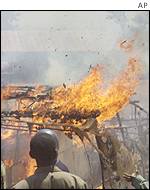Raising his hands to extend apologies to the angry and cursing lorry driver, Jozeh proceeds to the café. He is in a hurry to send out one of the last invitations to friends and relatives to attend his wedding meeting. The 4000,000 thousand salary advance he has received in just a drop in the ocean, given his wedding budget of 6 million.
For this month, his bill reads 250,000/= only, which is 80,000/= lower compared to the previous month. Peninah as fiancé will be lucky to get a gift before they wed in a week’s time.
 Jozeh as any other young man wonders where to get the money to make his wedding a success.
Jozeh as any other young man wonders where to get the money to make his wedding a success.In Kampala, the months of August to December are so memorable to its dwellers due to weddings and parties. This merry period usually make outfit designers to make a wide smile due to the huge profits and big sales.
Today, weddings in Kampala have become pocket-squeezing factor. Many couples that want to marry have resorted to ask friends and family members to contribute financially for weddings. As Jacob Noowe puts it, “Men want to make a statement to a woman and friends around her; even if they quarrel ten years later, when they look back to the wedding they remember that there was love at least at one time. In some cases, the parents or friend want to make you happy. So they have to make a very big wedding.”
“Men, this is an occasion that comes once, so all have to be done to make it happen, If I have the dime [money] or not. My friends cannot let me down, they have to see the nigger up, you heard me?” says MC Linx.
For some wedding organizers, they have resorted to webpage sms to reach the friends and relatives with simple message of inviting them for wedding meeting or update them on the days remaining days before the wedding. Some people like Rose Sematimba say, “Web sms are usually good, but a times they bore, when they are monotonous asking someone to honour the pledges”.
Poor contributions in wedding meetings have made some marriages to be postponed. If a pace maker for instance starts with a small figure, get assured that less will be put in the “wedding bells” sack.
My suggestion to you who wants to wed and you have the money; sky is the limit but for those who have little money, do you really have to ask for contribution from friends or the public? Why don’t you go for a civil marriage or simple church wedding that is less costly?
***photo was got from www.flickr.com



